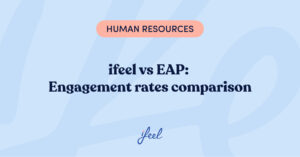Meditation, attention, mindfulness at work... A heroine or a villain when we talk about our psychological well-being? Neither one thing nor the other, as long as we are clear about what we are talking about. This will help us set the right expectations about what we can achieve with this type of technique.
Regardless of whether we are enthusiastic about them or they seem silly to us, meditation techniques are there, they have been around for centuries and they are useful as long as they are well understood and practiced. Therefore, it is essential to sustain our enthusiasm when we talk about mindfulness at work, to know what it is, and not to confuse it with miraculous methods to become all-rounders, happy and gifted employees. Sad but true, it takes more than meditation to achieve such miracles.
That is why we want to talk to you about how to practice mindfulness at work from a realistic and efficient perspective, taking into account the company’s needs but also the characteristics of real workers.
An ounce of prevention is worth a pound of cure
When it comes to caring for employees’ psychological well-being, a good recommendation for those responsible for managing human capital is to be guided by a simple criterion of ecology.
This means that it is not wrong to try to counteract some components of workers’ psychological discomfort, for example with mindfulness at work. However, wouldn’t it be better to adopt measures so that this discomfort does not occur in the first place, and therefore, don’t have to prevent it?
To alleviate anxiety is good. To not produce it is even better
In this sense, as a company we must understand something important: using many resources to practice mindfulness at work as a method to alleviate tension, stress, or the unfavorable work environment to which employees are subjected is better than doing nothing… but it does not seem a very efficient strategy.
After all, what have we learned from ecology? That waste must be reused and recycled, but above all, it must be reduced. This means, no more and no less, that there is no better waste than that which is not produced.
If we apply this to mental well-being at work, we can consider that it is fine to use mindfulness at work to deal with the toxicity we suffer, but that it is much better to implement a preventive strategy.
So, if we want to be efficient and not simply responsive, let’s consider the following. Let’s not generate so much overload and so it will not be (so) necessary to use energy to unload stress and relax. Let’s not generate so much dispersion and it will not be so necessary to train concentration. Let us not generate so much obsession with the future and so it will not be necessary to relearn to be in the present. In short, let’s not generate so many inconsistencies or dysfunctions in the corporate culture and work methodology, and so it will not be so costly to learn to accept our work and our company as they are.
Objectives when practicing mindfulness at work
Once all the above is established and we are ready to introduce meditation techniques to life in the office, we must be clear about the objectives we are pursuing. In a very summarized way, we can consider that the practice of mindfulness at work has two purposes.
1. Increase capacity to address
In other words, when we talk about being present (here and now) in our professional life, we are not talking about any complex or mystical concept, but about “being where we are”, as we say colloquially. This means that living in the present moment implies, broadly speaking, paying attention to the task at hand and not dividing it unnecessarily.
Achieving this goal through the correct and continuous practice of mindfulness at work will not make us happier but it will help us work better. How? If we strengthen the attention we pay to “one task at a time” is more likely to increase our ability to receive and process information preventing overload in our system.
2. Build an acceptance attitude
Acceptance does not mean we are delighted with everything that happens, it means we are not permanently in a dynamic of flight or fight regarding the aspects of our work that we dislike, or desperately trying to hold on to what we do like.
With greater or lesser success, the real mindfulness techniques at work aim to teach us to be content with what is there, in a friendly and non-tense way. We should be at ease with the fact that both the pleasant and the unpleasant things that happen inside us -to a certain extent- take turns in our existence, also in our existence as employees.
Of course, this does not apply to situations of suffering, abuse, or burnout which, far from being accepted with equanimity, must be tackled as far as we can.
Managing the expectations of mindfulness at work effectively
Both benefits gained through a correct, continuous, and most importantly, realistic practice of mindfulness at work can have an impact on the psychological well-being of the employee and, therefore, on their productivity and interpersonal relationships.
It is important to bear in mind that they must be applied correctly, but we should not expect them to increase employee happiness or magically double their intelligence and performance.
That is not going to happen, but it is still interesting to introduce new attitudes, practices, or concepts related to the field of mindfulness at work. It won’t work miracles, but it won’t do any harm either.
Improving employees’ psychological well-being
Ifeel has developed an emotional well-being program for companies, designed by its team of leading psychologists with one main objective: to help companies put employee health at the heart of their strategy to boost sustainable productivity.
Thanks to this partnership, those in charge of HR departments can receive personalized, data-driven advice on how to make good decisions in a company to get the most out of the teams they are in charge of and to take better care of the psychological well-being of the people in them.
Moreover, this program offers employees a holistic mental health care service structured at different levels according to their needs. This service includes, if required, online psychological therapy with a psychologist specialized in cases like theirs. Try our program now so you can see how it could help you.
We hope you found this post about mindfulness at work interesting. If you want more information about our emotional well-being program for companies simply request it and we will contact your team as soon as possible.
You may also be interested in this post about mental health at work.







